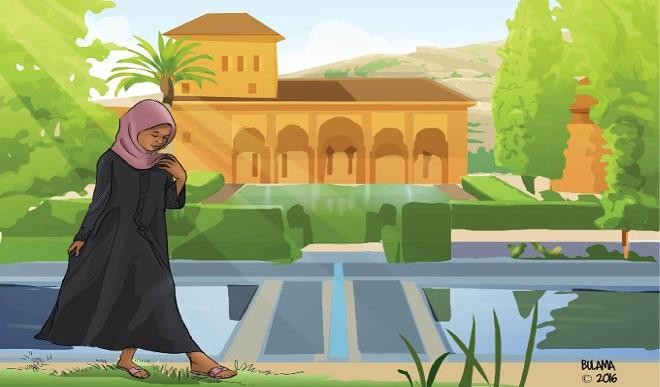
‘But is this right Mummy?’ Little Bint asked as she stood atop the upstairs parking lot surveying the big beautiful garden below. ‘I thought you said Islam doesn’t approve of such grandeur.’ She added disapprovingly.
‘Yes you are right LB, Islam does not encourage such a grandiose lifestyle. But when they came into great wealth, latter-day Muslim rulers did not look up to the Rasulilah SAW or his Righly-guided Companions for guidance on how to live their lives. They chose to emulate the Chinese and Greek emperors who existed before Islam and modelled their lives accordingly.’ I answered.
‘No wonder they can afford to built a palace as big as a town and have it fortified the way this one is. Look at this Alhambra, centuries after their death, we can’t even go in without prior booking.’ She complained.
‘It’s true but that’s not the doing of the dead sultans, it is the present government which is making so much money out of the grand old palace that its making it difficult for people to be inside anytime they wished, in order to add to the mystery.’ I explained. At just that moment, Tahir appeared before us followed by our older children.
‘What are you two doing stuck here while we were all over the place viewing this great historical edifice?’ He asked.
‘Oh sorry, we didn’t realise you were missing us. LB here is getting some historical lessons from me when she asked whether Muslim leaders should have lived in such beauty and grandeur when Islam does not approve of it. And I told her that the sultans and emirs who lived in Alhambra and similar palaces across the Muslim world did not look up to the Rasulillah and his noble Companions when they became rulers. Because they had so much wealth they decided to show it off through living in excess grandeur. Instead of copying the austere lifestyle of The Prophet and his disciples they chose to emulate Chinese, Persian and Roman emperors. And the result was palaces like this one.’ I explained.
‘Yes, your Mum is right LB. The Muslim rulers who built islamic empires also led their lives like the emperors who ruled the world before them. In Turkey, there is the Topkapi palace. Highly reminiscent of this one, with its fortified walls, marble domes and archways as well as exquisite oriental decor. And the same obtains in India, in Iraq and anywhere that Muslim Sultans led the world from. They all had this belief that living in that earthly grandeur is part of what will add to their awe and reverence by the people.’ Tahir contributed.
‘Yet it did not stop them from dying when their time came.’ Ummi chipped in from where she stood next to her father. ‘I mean despite the impregnable fortresses they built to shield themselves from enemies amd elongate their rule, they still succumbed to the inevitable hands of death when it was time to go. How I wished they had emulated their pious predecessors who lived in this world as though they were travellers.’ She concluded, philosophically.
‘You know, this was exactly how I felt the first time I saw the Topkapi palace in Istanbul. I looked at the grand edifice and the beautiful portraits of the various Sultans who built in it or just lived there and wondered whether all that labour was worth it. I mean now that they had turned to dust and bones, is it any joy to them that they had spent so much time and wealth building their earthly paradise? I saw a similar palace at Fez in Morocco and wondered the same thing. Did those rulers ever think of dying at all. But I also read somewhere that the idea was to have a taste of paradise while here on earth. That was why they built palaces with running fountains and artificial streams, in anticipation of the islamic heaven which has gardens beneath which river flow. But now we see the folly of it all. They gave their all to what will not benefit them in the next world. What a waste.’ I lamented.
‘Well don’t condemn them like that Bint. These rulers might have over indulged themselves as far as their lifestyles were concerned but they did contribute to science and modern civilisation when they established schools and observatories and encouraged scientific enquiry and discovery. They were also patrons of the arts and that was how we got to learn about some of the momentous events that happened during their time.
The golden age of islamic civilisation happened under these rich and over indulgent rulers. Scholars like AlKhwarizmi, whose discoveries led to the birth of the modern computer and Ibn Cina the father of modern medicine, Al Haytham, whose computations led to the eye glasses that we use, all flourished under those wealthy sultans. Al Farnas who was the first man to fly and whose calculations led to the invention of the aeroplane by the Wright brothers actually existed here in Andalusia or Muslim Spain.
So it wasn’t all joy and excess and a folly called the Alhambra, it was also a period of great educational and scientific achievement.’ Tahir concluded.
‘Yes it’s true Daddy’ Mahmoud joined in ‘I remember reading this quote from Carly Fiorina, a former CEO of Hewlett-Packard computer company, who once spoke about the contribution of Muslim scientists to modern civilisation. She said:
Its architects designed buildings that defied gravity. Its mathematicians created the algebra and Algorithm that will enable the building of computers and the creation of encryption. Its doctors examined the human body and found new cures for diseases. Its astronomers looked into the heavens, named the stars and paved the way for space travel and exploration. Its writers created thousands of stories; stories of courage, romance and magic. When other nations were afraid of ideas, this civilization thrived on them and kept them alive. The civilisation I’m talking about was the Islamic world from the year 800 to 1600 AD.’ Mahmoud quoted.
‘Masha Allah, you crammed every word.’ I commended.
‘I’m very proud of my Islamic heritage that’s why I memorised it.” He replied, making us all smile in agreement.When other nations were afraid of ideas, this civilization thrived on them and kept them alive. The civilisation I’m talking about was the Islamic world from the year 800 to 1600 AD.’ Mahmoud quoted.
‘Masha Allah, you crammed every word.’ I commended.
‘I’m very proud of my Islamic heritage that’s why I memorised it.” He replied, making us all smile in agreement.

 Join Daily Trust WhatsApp Community For Quick Access To News and Happenings Around You.
Join Daily Trust WhatsApp Community For Quick Access To News and Happenings Around You.

